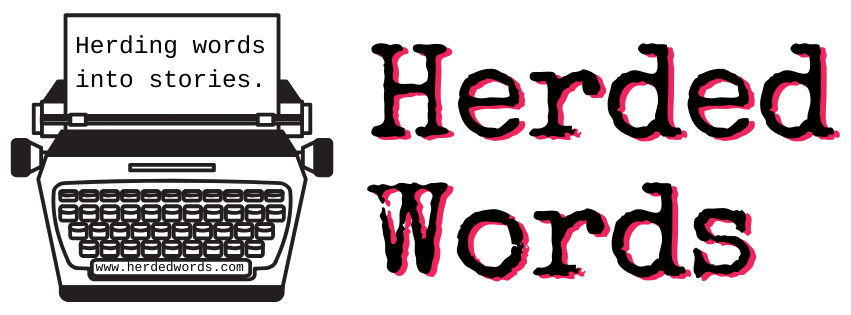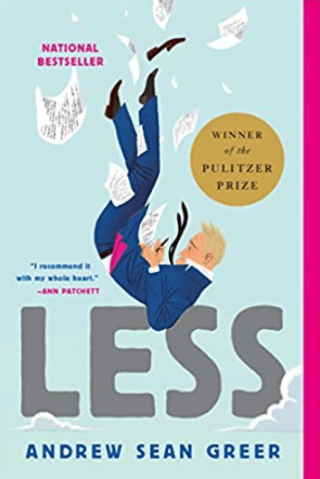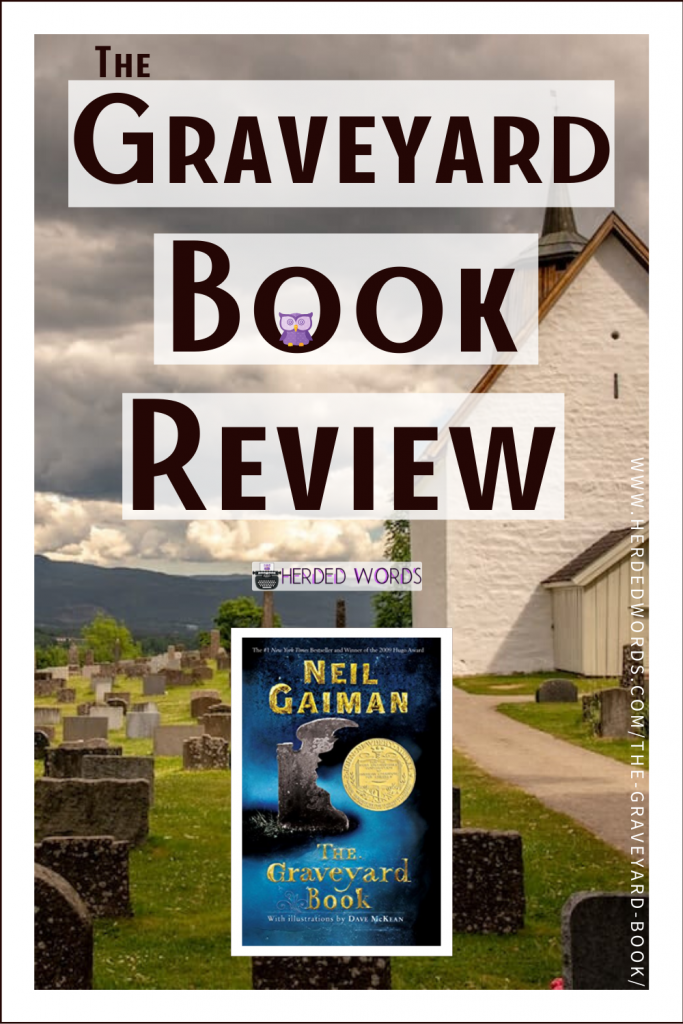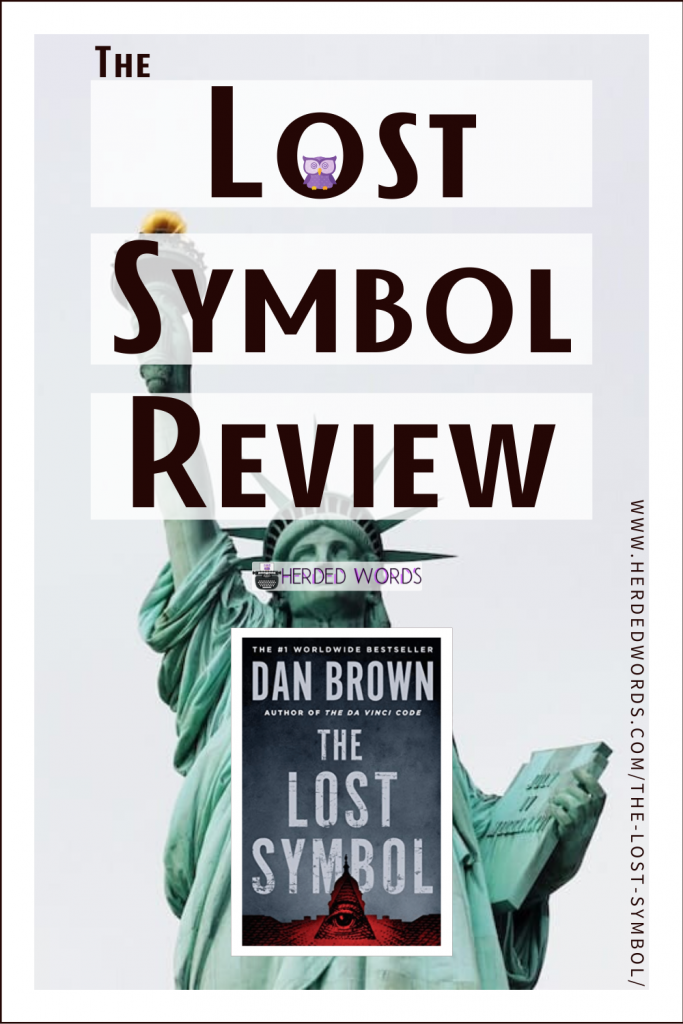
Herdedwords.com uses affiliate links. This means we receive a commission on the sale of certain items. This is at NO additional cost to you. Visit the policies page to learn more.
LESS, published in 2017, is a satirical comedy novel by Andrew Sean Greer.
LESS won the 2018 Pulitzer Prize for Fiction.
“You should be at the beach, like today. You should get stoned and drunk and have loads of sex.” She takes another drag off her cigarette.
Table of Contents
LESS Synopsis
Who says you can’t run away from your problems? You are a failed novelist about to turn fifty. A wedding invitation arrives in the mail: your boyfriend of the past nine years is engaged to someone else. You can’t say yes–it would be too awkward–and you can’t say no–it would look like defeat. On your desk are a series of invitations to half-baked literary events around the world.
QUESTION: How do you arrange to skip town?
ANSWER: You accept them all.
What would possibly go wrong? Arthur Less will almost fall in love in Paris, almost fall to his death in Berlin, barely escape to a Moroccan ski chalet from a Saharan sandstorm, accidentally book himself as the (only) writer-in-residence at a Christian Retreat Center in Southern India, and encounter, on a desert island in the Arabian Sea, the last person on Earth he wants to face. Somewhere in there: he will turn fifty. Through it all, there is his first love. And there is his last.
Because, despite all these mishaps, missteps, misunderstandings and mistakes, Less is, above all, a love story.
LESS Analysis Of:
Less is used as an example in the following posts. Check them out!
| Present Tense | Present tense happens now. Check out 5 times it’s the best choice for your novel. |
| Omniscient Point of View | Omniscient point of view is all knowing. Learn 5 times to use it in your story. |
| Rising Action | The rising action is the period between the inciting incident and climax. Learn how to nail your rising action with these 4 elements. |
| the Skeptic | Learn the importance of the skeptic character and their two roles. Plus, see modern fiction examples. |
| Minor Characters & Extras | A story world is filled with minor characters and extras. Learn their four jobs and see modern examples. |
LESS Book Reviews
I was thoroughly entertained by this book. Except for the narration.
I don’t want to spoil things for you but the felt like it was a strange first-person tale. One of those irritating people who speak about themselves in the first person, that’s what I always thought was happening.
Unfortunately, it was not. The narrator was an actual character in the book (you’ll find out who at the end). It didn’t work for me, I found every mention of the actual narrator jarring.
Luckily, the narrator doesn’t mention themself often. Other than that, it was a truly enjoyable read that I’d highly recommend.
But what do others think?
I sped through Less by Andrew Sean Greer, like a six year old ripping open a birthday present.
– The Bibliophage
What immediately struck me was the unusual narrative structure; predominantly first-person present tense (identity undisclosed) yet omnipresent.
– Book Lover Book Reviews
There is so much sparkle, wit and pain in this work.
– Queer Readers

Writing Practice
Check out these writing exercises and prompts inspired by LESS.
Prompt: The Opening Paragraph(s)
This is the opening paragraph of the novel. Ignore everything you know about the story and use it as a writing prompt.
Your Task: Using as much detail as possible, write another 300+ words.
Less at First (Chapter 1)
From where I sit, the story of Arthur Less is not so bad.
Look at him: seated primly on the hotel lobby’s plush round sofa, blue suit and white shirt, legs knee-crossed so that one polished loafer hangs free of its heel. The pose of a young man. His slim shadow is, in fact, still that of his younger self, but at nearly fifty he is like those bronze statues in public parks that, despite one lucky knee rubbed raw by schoolchildren, discolor beautifully until they match the trees. So has Arthur Less, once pink and gold with youth, faded like the sofa he sits on, tapping one finger on his knee and staring at the grandfather clock. The long patrician nose perennially burned by the sun (even in cloudy New York October). The washed-out blond hair too long on the top, too short on the sides—portrait of his grandfather. Those same watery blue eyes. Listen: you might hear anxiety ticking, ticking, ticking away as he stares at that clock, which unfortunately is not ticking itself. It stopped fifteen years ago. Arthur Less is not aware of this; he still believes, at his ripe age, that…
Exercise: Rewrite
I think one of the main reasons I thought the narrator was
*SPOILER ALERT*
Arthur Less himself, was because the book is written in the present tense. It just never crossed my mind that another character would have present tense access to all the information provided.
And yet, Arthur Less is not the narrator.
Your Task: Choose a passage and rewrite it in the past tense.
Exercise: Narration
The narration in LESS is unique.
This exercise is not writing practice (although feel free to test out changing a scene to a proper first or third person narration).
Your Task: Think about the narration – deeply.
Think about it:
- Did you know before you read the book who the narrator is?
- If so, do you think this affected how you thought about the book compared to someone who didn’t know?
- If not, how do you think your opinion might have been different if you’d known?
- Looking back, does all the narration make sense?
- If you were going to rewrite this story who would you choose as the narrator? Would you keep it in present tense? Why?

LESS Facts
LESS Thoughts?
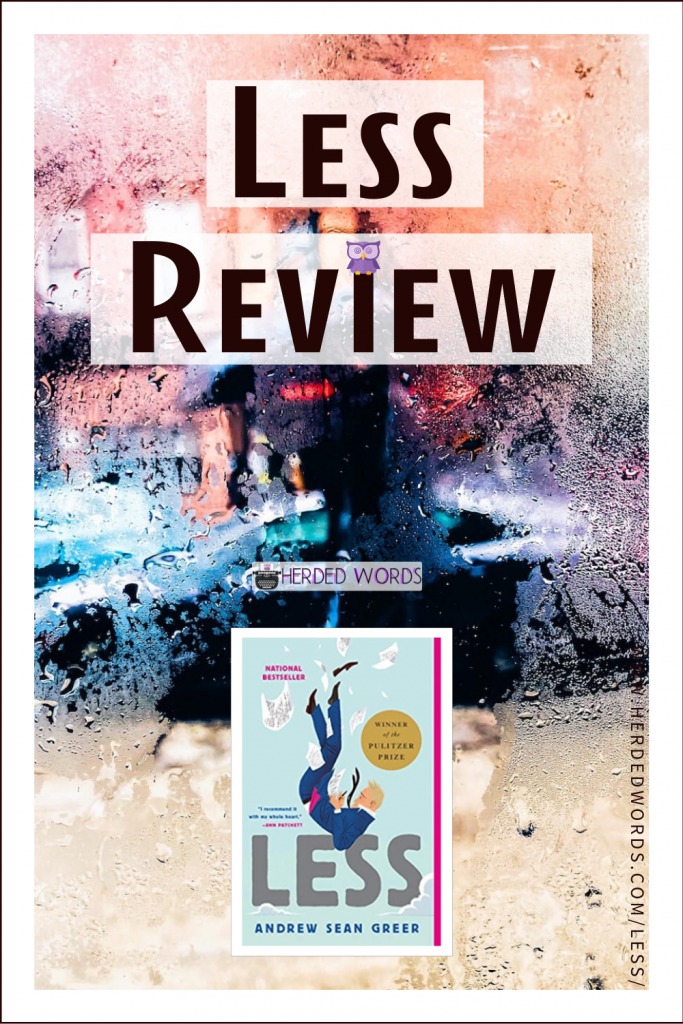
Have you read LESS?
If so, what did you think? If not, will you?
Like this post? Please PIN IT and follow me on social media. Thanks!
PS. share your exercises in the comments below. I’d love to see them.
